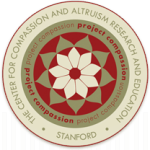Muitas vezes pensamos que seremos mais felizes por realizar, receber ou obter. Nós também achamos que, para ser feliz, temos que receber amor. Pense novamente!
A pesquisa mostra que a nossa maior satisfação vem em grande parte de estar ligado aos outros e de ajudá-los.
Há verdade no ditado “É dando que se recebe.”
Compaixão traz significado e os pesquisadores descobriram que viver uma vida de significado é um dos maiores determinantes da felicidade. Não só a compaixão garante profundidade, realização e propósito em nossas vidas, mas os estudos mostram que ela também tem benefícios poderosos para a saúde e até mesmo leva a uma vida mais longa!
Para ajudar a mantê-lo inspirado, eu resumi a pesquisa sobre compaixão em um infográfico útil! Divirta-se!
Post original CCARE
Post por Dr Emma Seppala
 Dr. Emma Seppala
Dr. Emma Seppala
Diretora Associada do CCARE
Emma Seppala é a Diretora Associada do CCARE, bem como uma cientista de pesquisa e membro honorário da Universidade do Centro de Wisconsin-Madison para investigar Mentes Saudáveis. Suas áreas de especialização são a psicologia da saúde, bem-estar, e resiliência. Ela examina o impacto da meditação sobre a felicidade, conexão social e compaixão.
Dr. Emma Seppala
– See more at: http://ccare.stanford.edu/uncategorized/top-10-scientific-benefits-of-compassion-infographic-3/#sthash.59yVDAKv.dpuf
Emma Seppala, PhD
Emma Seppala, Ph.D. is Associate Director of the Center for Compassion and Altruism Research and Education at Stanford University. She obtained her BA from Yale, her MA from Columbia University and her PhD in Psychology from Stanford University. Emma’s areas of expertise are health psychology, well-being, and resilience. She has examined the impact of meditation on happiness, social connection, and compassion. She has also investigated the effects of yoga-based interventions for combat veterans returning from Iraq and Afghanistan with post-traumatic stress disorder. She is the recipient of a number of grants and awards including the James W. Lyons Award awarded by Stanford University for service to the Stanford campus: she helped found Stanford’s first class on the Psychology of Happiness and taught a large number of well-being programs for students. Emma’s research has been cited in numerous television and news outlets including ABC News and The New York Times as well as books such as Congressman Tim Ryan’s Mindful Nation and documentary films such as Free the Mind. Emma often gives talks on the psychology of health and well-being to academic, corporate, and governmental institutions including places such as Google, the National Science Foundation, and a US Congressional Hearing. In addition to her work at Stanford, she is also a popular Psychology Today blogger and contributor to Scientific American Mind, the Huffington Post, Mindful and Spirituality & Health magazine
– See more at: http://ccare.stanford.edu/about/people/ccare-staff/#391
Emma Seppala, PhD
Emma Seppala, Ph.D. is Associate Director of the Center for Compassion and Altruism Research and Education at Stanford University. She obtained her BA from Yale, her MA from Columbia University and her PhD in Psychology from Stanford University. Emma’s areas of expertise are health psychology, well-being, and resilience. She has examined the impact of meditation on happiness, social connection, and compassion. She has also investigated the effects of yoga-based interventions for combat veterans returning from Iraq and Afghanistan with post-traumatic stress disorder. She is the recipient of a number of grants and awards including the James W. Lyons Award awarded by Stanford University for service to the Stanford campus: she helped found Stanford’s first class on the Psychology of Happiness and taught a large number of well-being programs for students. Emma’s research has been cited in numerous television and news outlets including ABC News and The New York Times as well as books such as Congressman Tim Ryan’s Mindful Nation and documentary films such as Free the Mind. Emma often gives talks on the psychology of health and well-being to academic, corporate, and governmental institutions including places such as Google, the National Science Foundation, and a US Congressional Hearing. In addition to her work at Stanford, she is also a popular Psychology Today blogger and contributor to Scientific American Mind, the Huffington Post, Mindful and Spirituality & Health magazine
– See more at: http://ccare.stanford.edu/about/people/ccare-staff/#391
Emma Seppala, PhD
Emma Seppala, Ph.D. is Associate Director of the Center for Compassion and Altruism Research and Education at Stanford University. She obtained her BA from Yale, her MA from Columbia University and her PhD in Psychology from Stanford University. Emma’s areas of expertise are health psychology, well-being, and resilience. She has examined the impact of meditation on happiness, social connection, and compassion. She has also investigated the effects of yoga-based interventions for combat veterans returning from Iraq and Afghanistan with post-traumatic stress disorder. She is the recipient of a number of grants and awards including the James W. Lyons Award awarded by Stanford University for service to the Stanford campus: she helped found Stanford’s first class on the Psychology of Happiness and taught a large number of well-being programs for students. Emma’s research has been cited in numerous television and news outlets including ABC News and The New York Times as well as books such as Congressman Tim Ryan’s Mindful Nation and documentary films such as Free the Mind. Emma often gives talks on the psychology of health and well-being to academic, corporate, and governmental institutions including places such as Google, the National Science Foundation, and a US Congressional Hearing. In addition to her work at Stanford, she is also a popular Psychology Today blogger and contributor to Scientific American Mind, the Huffington Post, Mindful and Spirituality & Health magazine
– See more at: http://ccare.stanford.edu/about/people/ccare-staff/#391


